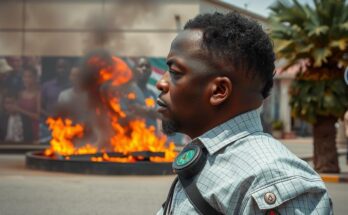Human rights groups have raised alarms regarding the Azerbaijani government’s alleged crackdown on environmental activists during COP29. With accusations of increased arrests and suppression of dissent, concerns about the selection of host countries for climate summits have been amplified. While Azerbaijani officials deny claims of human rights violations, the presence of hundreds of political prisoners poses a significant challenge to the integrity of the climate discussions.
Human rights organizations have expressed grave concerns regarding the Azerbaijani government’s treatment of environmental activists and political dissidents amid the ongoing COP29 climate summit. Allegations have surfaced suggesting that the government is using the platform to suppress dissent and intimidate critics. This represents a troubling continuation of experiences witnessed in previous summit-hosting nations, raising significant questions about the selection criteria for future hosts. Claims from groups such as the Climate Action Network emphasize that safeguarding civil rights is essential for generating meaningful progress in climate policy. In response to the accusations, Azerbaijani officials firmly deny any wrongdoing, asserting that there are no political prisoners. However, reports indicate a substantial increase in the number of imprisoned dissenters in Azerbaijan, which has grown to over 300 individuals, including journalists and environmental advocates since COP29’s announcement.
The COP29 climate summit, currently taking place in Azerbaijan, is further complicated by allegations of human rights violations against the host nation’s government. Human rights groups highlight that Azerbaijan has intensified its crackdown on activists, leading to a worrying trend in civil rights suppression over the past year. The situation underscores broader concerns regarding how countries are selected to lead global climate discussions when they exhibit systemic violations of human rights. This year’s summit has already witnessed a significant escalation in arrests of those opposing the government, raising calls from human rights organizations for a reevaluation of host country selection processes.
The ongoing COP29 conference in Azerbaijan has brought to light the critical interplay between environmental activism and human rights. As accusations of repression mount, the international community faces the challenge of addressing these civil rights issues while striving for effective climate action. The need for protective measures for activists remains paramount, as emphasized by various human rights groups. Without safeguarding civil society, substantial progress in climate change negotiations may remain elusive.
Original Source: www.bbc.com




